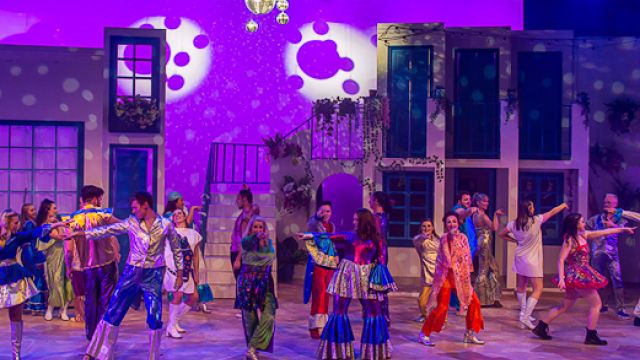Mamma Mia!
The first thing that strikes you when Mamma Mia! commences is the set, showing the outside of a small hotel, painted in genuine Greek Isle hues with whitewashed walls, an enlivening backdrop to a rich evening’s dancing and singing.
After a somewhat dull opening with a low-powered spotlight on the show’s opening number, the show’s lighting, once it erupted in full, was brilliant: warm, colourful, and right on target. Even so, those sitting toward the front may have been lucky enough to be able to see into an enclosed orchestra pit that housed the high-tech live band from which the music poured through most of the show.
The leads were well cast and fortunately knew how to sing and to sing well. Of course, the most vital component of a musical highlighting many of ABBA’s most enduring hits must be the quality of its music.
I’m pleased to report that articulation in both speaking and singing was beautifully crisp and the singing very nearly note perfect, every word clear of the modified lyrics of such energetic classics as “Money, Money, Money”, “Mamma Mia!”, and, as encores, “Dancing Queen” and “Waterloo”.
Renditions by Louiza Blomfield, playing Sophie’s mother, Donna, of “The Winner Takes It All” and “Slipping Through My Fingers” held the emotional intensity to move us; Helen McFarlane, in fine voice on “Does Your Mother Know”, was understated enough to be genuinely amusing; and several other songs communicated the losses that time brings to us all. Paul Sweeney’s voice had little opportunity to be heard as it should be; his singing on “Thank You for the Music” and “The Name of the Game” was a joy. But the music in general was far too joyful to do less than uplift everybody.
A couple of songs could have been played in a lower key in order to better match their soloists’ natural ranges and allow them to sing the top notes originally written; but, at least on opening night, all of the leads hit their designated notes well, and the chorus’s additional harmonies, consistently in tune and reasonably balanced, emulated the richness of the songs’ original recordings.
To complement some fine singing, the live band’s instrumental accompaniment was flawless; quite an achievement in playing arrangements uncompromising of the music’s complexity. Even the tricky timing of “Money Money Money” was spot on.
With the exception of a short segment in which Sophie and her friends exaggerate an uncharacteristic and frankly unbelievable sexual display — the acting by all, especially voice tone, was constrained enough to maintain an illusion of emotional reality. This most important aspect of theatre warrants some recognition: the success of director and cast in making good use of the cast’s genuine emotions was a standout.
Even finer was the production’s dancing. Imaginatively choreographed, very well coordinated, and performed with energy and precision though the dancers were also singing, the dancing doubled the joy that ABBA’s music brought to a story in itself a clever cross of modern-day romance and comic family drama. If the singing brought joy, the dancing brought the entire show to life and huge smiles to the faces of the entire audience. The show is a delight.
John P. Harvey
Subscribe to our E-Newsletter, buy our latest print edition or find a Performing Arts book at Book Nook.

